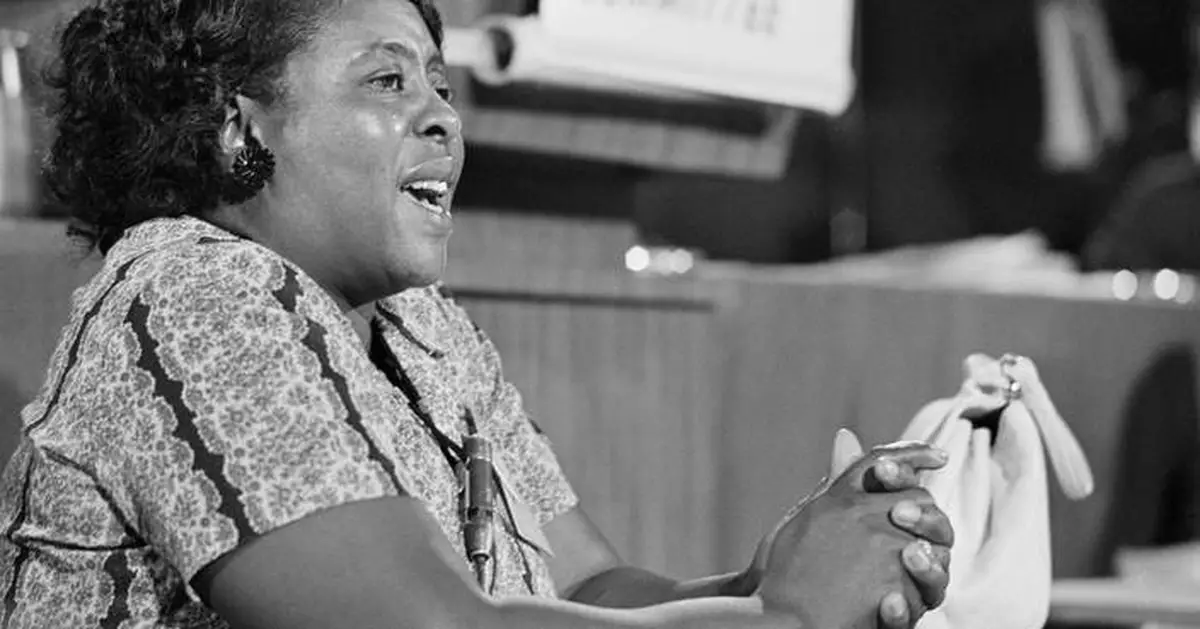JACKSON, Miss. (AP) — Vice President Kamala Harris is accepting the Democrats' presidential nomination Thursday, exactly 60 years after another Black woman mesmerized the nation with a televised speech that challenged the seating of Mississippi's all-white delegation to the 1964 Democratic National Convention.
The testimony of Fannie Lou Hamer to the credentials committee in Atlantic City, New Jersey, was vivid and blunt.
She described how she was fired from her plantation job in retaliation for trying to register to vote and brutalized in jail for encouraging other Black people to assert their rights. She told of arbitrary tests that white authorities imposed to prevent Black people from voting and other unconstitutional methods that kept white elites in power across the segregated South.
“All of this is on account of we want to register, to become first-class citizens,” Hamer told the committee.
Whether every eligible citizen can vote and have their vote be counted is still an open question in this election, said U.S. Rep. Bennie Thompson, who spoke Wednesday at the Democratic National Convention in Chicago, about how his late father never got to vote because of Jim Crow restrictions. Thompson got his first practical experience in democracy at Hamer’s urging in 1966, when he was a college student in Mississippi and she recruited him to register other Black voters.
Hamer has been the subject of appreciation this week during the convention.
“Our challenge as Americans is to make sure that this experiment called democracy is not just for the the landed gentry or the wealthy, but it is for everybody,” said Thompson, who led the House committee that investigated the Jan. 6, 2021 insurrection at the U.S. Capitol.
Hamer was raised in cotton fields of the Mississippi Delta and became a sharecropper. She joined the Student Nonviolent Coordinating Committee and helped organize Freedom Summer, a campaign to educate and register Black voters. With Mississippi conducting whites-only primaries, activists formed the racially integrated Mississippi Freedom Democratic Party to confront leading Democrats on a national stage.
“If the Freedom Democratic Party is not seated now, I question America," Hamer told the credentials committee. "Is this America, the land of the free and the home of the brave, where we have to asleep with our telephones off of the hooks because our lives be threatened daily, because we want to live as decent human beings, in America?”
President Lyndon B. Johnson hastily called a news conference during Hamer’s testimony to try to divert attention from divisions that could alienate white voters in the South. TV cameras cut away, but networks showed her speech later.
Top Democrats said Hamer's group could seat two delegates, but that was too little for the Freedom Democrats. And it was too much for the regular Mississippi delegation, which fled the convention without declaring loyalty to LBJ, and eventually left for good as conservative Democrats across the South, including segregationists, switched to the Republican party.
Leslie-Burl McLemore was one of the Freedom delegates and recalls how determined they were.
“I knew in my mind, because I’m 23 years old and I’m vice chair of the Freedom Democratic Party, I’m not going to accept that damn compromise,” the retired political science professor at Jackson State University said recently at the Mississippi Civil Rights Museum in Jackson.
“We had four white folk in our delegation and the white folks didn’t have no Black folk in their delegation,” McLemore said. “So, hey, we had God on our side.”
Other organizers included Ella Baker, Bob Moses, and David J. Dennis Sr. Only days before the 1964 convention, Dennis gave an impassioned eulogy at the funeral of James Chaney, the Freedom Summer volunteer who was killed along with Michael Schwerner and Andrew Goodman by Ku Klux Klansmen in Philadelphia, Mississippi.
That violence was fresh when Hamer testified about being evicted after trying to register to vote in 1962. She said the plantation owner told her, “'We’re not ready for that in Mississippi.'"
Hamer also recounted being jailed and beaten in 1963 in Winona, Mississippi, at the command of white law enforcement officers, after she and several other Black people returned from a voter education workshop. The beating permanently damaged her eyes, legs and kidneys.
On Tuesday, the first Mississippi Freedom Trail marker outside the state was unveiled in Atlantic City to commemorate the Freedom Democrats. Another marker, dedicated in June in Winona, recognizes the jail beatings. Euvester Simpson was 17 in 1963, and shared a cell with Hamer. She said she heard Hamer being whipped in another room.
“Mrs. Hamer told me she was in a lot of pain,” Simpson said, recalling how she soothed Hamer with damp rags and the gospel song, “Walk With Me.”
“Her back was hurting. Her hands were bleeding. She was swollen, because she had used her hands to kind of guard her back," Simpson said.
“State-sanctioned violence” is among the many issues from Hamer’s 1964 testimony that still resonate, said Keisha N. Blain, a Brown University historian. She cited the July 6 shooting death of Sonya Massey, a Black woman, by a deputy who responded to her 911 call.
“This theme is still lingering, even if the specific circumstances are different,” Blain said.
While Hamer didn't make it part of her testimony at the convention, she also was an advocate for bodily autonomy. A white doctor had performed a hysterectomy without her consent when she had a uterine tumor removed in 1961. Such treatment of Black women was so common in the South that Hamer called it a “Mississippi appendectomy.”
Blain noted in her 2021 book, “Until I Am Free: Fannie Lou Hamer’s Enduring Message to America," that Hamer feared both abortion and birth control were “white supremacist tools to regulate the lives of impoverished Black people and even prevent the growth of the Black population.”
Hamer kept speaking after the convention, famously saying she was "sick and tired of being sick and tired” over how long America was taking to ensure fair treatment. Another year went by before Johnson signed the Voting Rights Act of 1965, and then nearly another year before the Supreme Court upheld the law.
A 2013 Supreme Court ruling dismantled a significant part of the Voting Rights Act — the requirement for states with a history of racial discrimination in voting, mainly in the South, to get federal approval before changing the way they hold elections. "Many communities across the nation are grappling with attempts at voter suppression,” Blain said.
Hamer also advocated for fair treatment of Black farmers. The Biden administration in late July announced more than $2 billion in direct payments to Black and minority farmers who faced discrimination from the U.S. Department of Agriculture.
GOP vice presidential nominee JD Vance called this “disgraceful,” suggesting it is racist against white people. But Thompson said Black landowners had been refused credit and denied support from the USDA for many years. "The people who ran the federal agencies were part and parcel to the system of disenfranchisement,” Thompson said.
Wil Colom, a Mississippi lawyer who now serves on the Democratic National Committee and is in Chicago for the convention, was a teenager when he heard Hamer speak at a church in Ripley, Mississippi, in October 1964. The church was burned after her appearance. Colom said the speech was “electrifying" and motivated him to challenge segregation at theaters and swimming pools.
Colom said he visited Hamer at her modest home in Ruleville before she died of cancer at 59 in 1977.
“She had no perception, which surprised me, of what an important figure she had become,” Colom said.
The Freedom Democrats helped lead the way to President Barack Obama's election in 2008 and now to Harris' nomination, Dennis said.
“To me, it's all connected,” Dennis said. “It’s like a relay race. One baton moving to the next.”
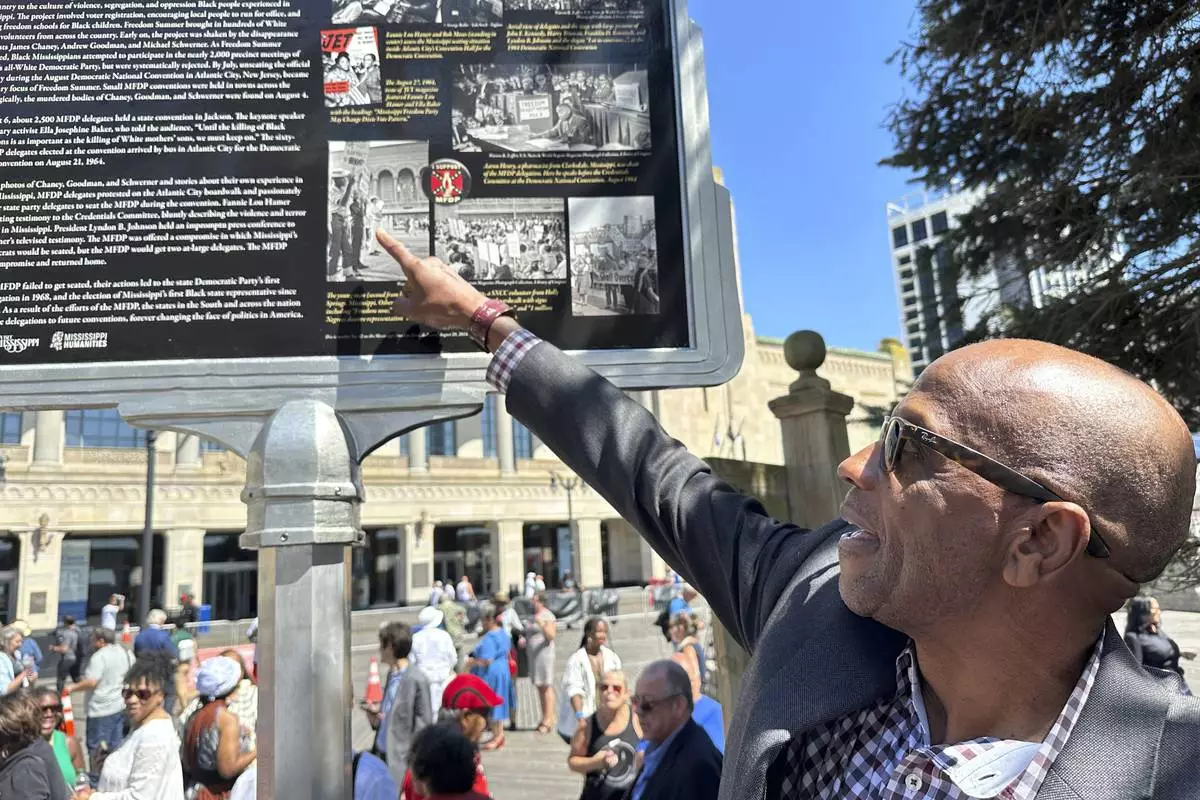
Roy DeBerry of the Student Nonviolent Coordinating Committee points to a photo of himself as a teenager on the newly unveiled Mississippi Freedom Trail marker on the boardwalk in Atlantic City, N.J., Tuesday, August 20, 2024. DeBerry was part of a racially-integrated group protesting the seating of an all-white Mississippi delegation to the 1964 Democratic National Convention at the location. (AP Photo/Ted Shaffrey)
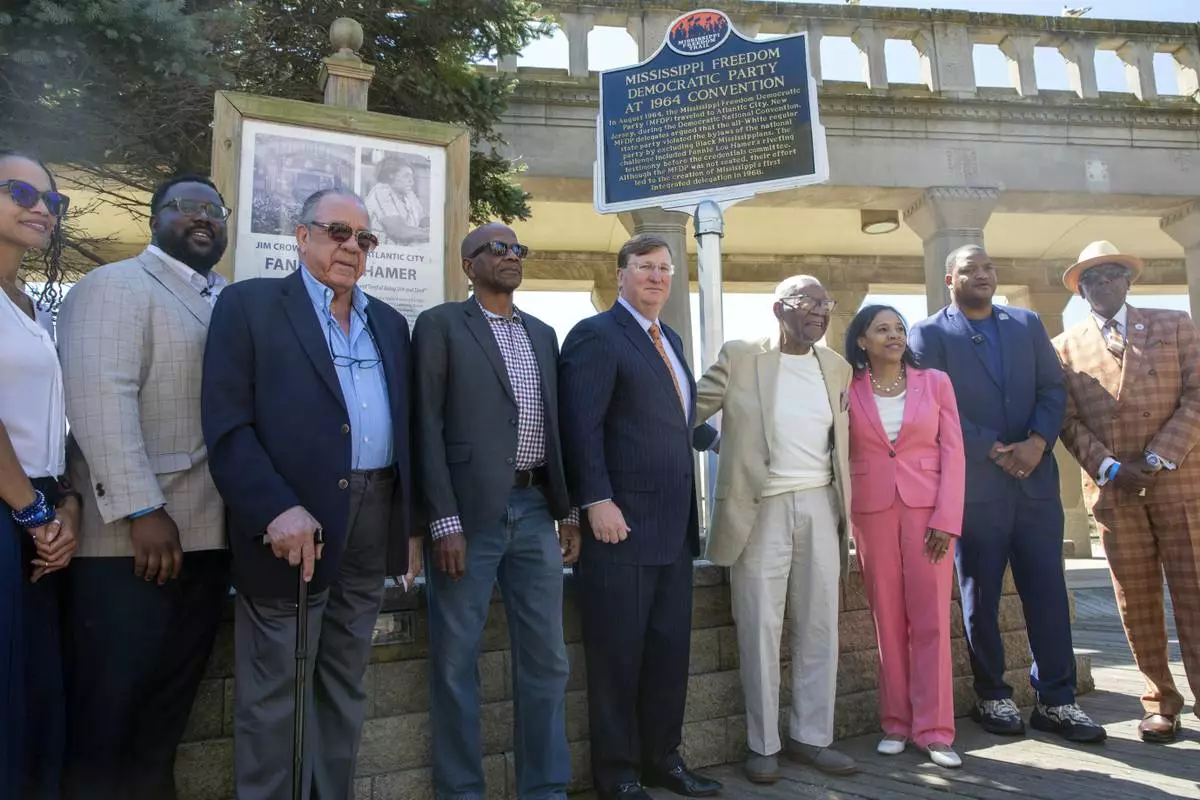
Elected officials and civil rights advocates unveil a Mississippi Freedom Trail marker on the boardwalk in Atlantic City, N.J., Tuesday, Aug. 20, 2024. From left: Tiyi Morris, daughter of civil rights advocate Euvestor Simpson; John Spann, Mississippi Humanities Council; Freedom Democrat Dave Dennis Sr.; Roy DeBerry of the Student Nonviolent Coordinating Committee; Mississippi Governor Tate Reeves; Ralph Hunter of the The African American Heritage Museum of Southern New Jersey; Tahesha Way, New Jersey Lieutenant Governor; Marty Small, Mayor of Atlantic City and Kaleem Shabazz, Atlantic City councilman. (AP Photo/Ted Shaffrey)
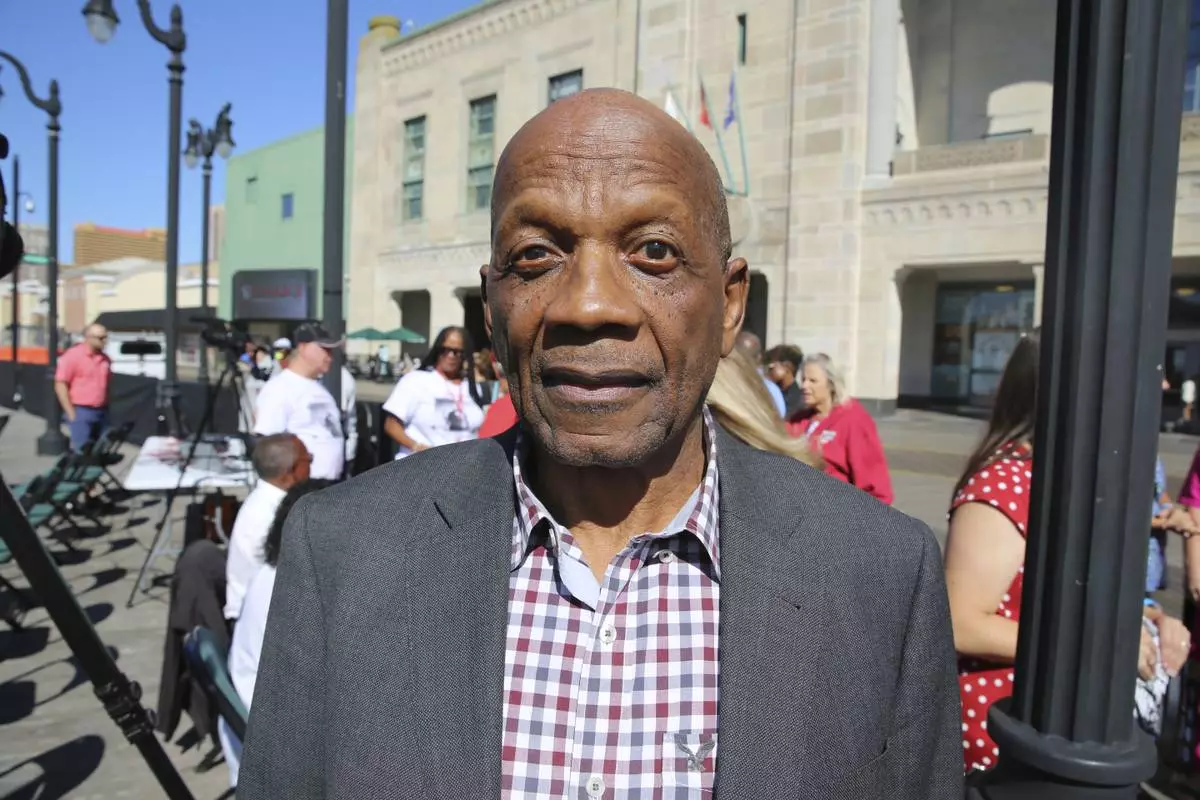
Roy DeBerry of the Student Nonviolent Coordinating Committee stands outside Boardwalk Hall in Atlantic City, N.J., Tuesday, Aug. 20, 2024, where he protested as a teenager when the Democratic National Convention was held at the hall in 1964. (AP Photo/Ted Shaffrey)
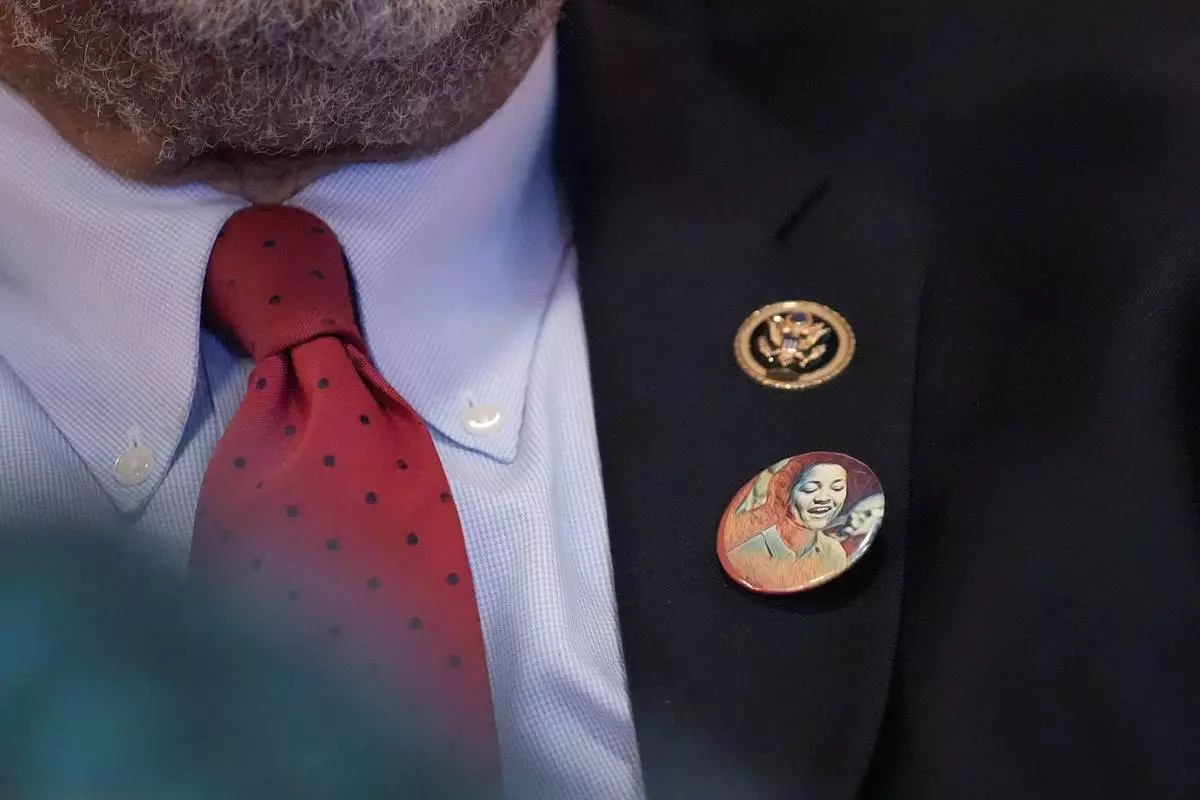
U.S. Rep. Bennie Thompson, D-Miss., wears a commemorative pin with the face of a young Civil Rights activist Euvester Simpson, June 8, 2024, in Winona, Miss., during the unveiling of a Mississippi Freedom Trail marker commemorating the brutality faced by her and other civil rights activists who were arrested in June 1963, at a bus station in Winona as they returned from an out-of-state citizenship training session. (AP Photo/Rogelio V. Solis)
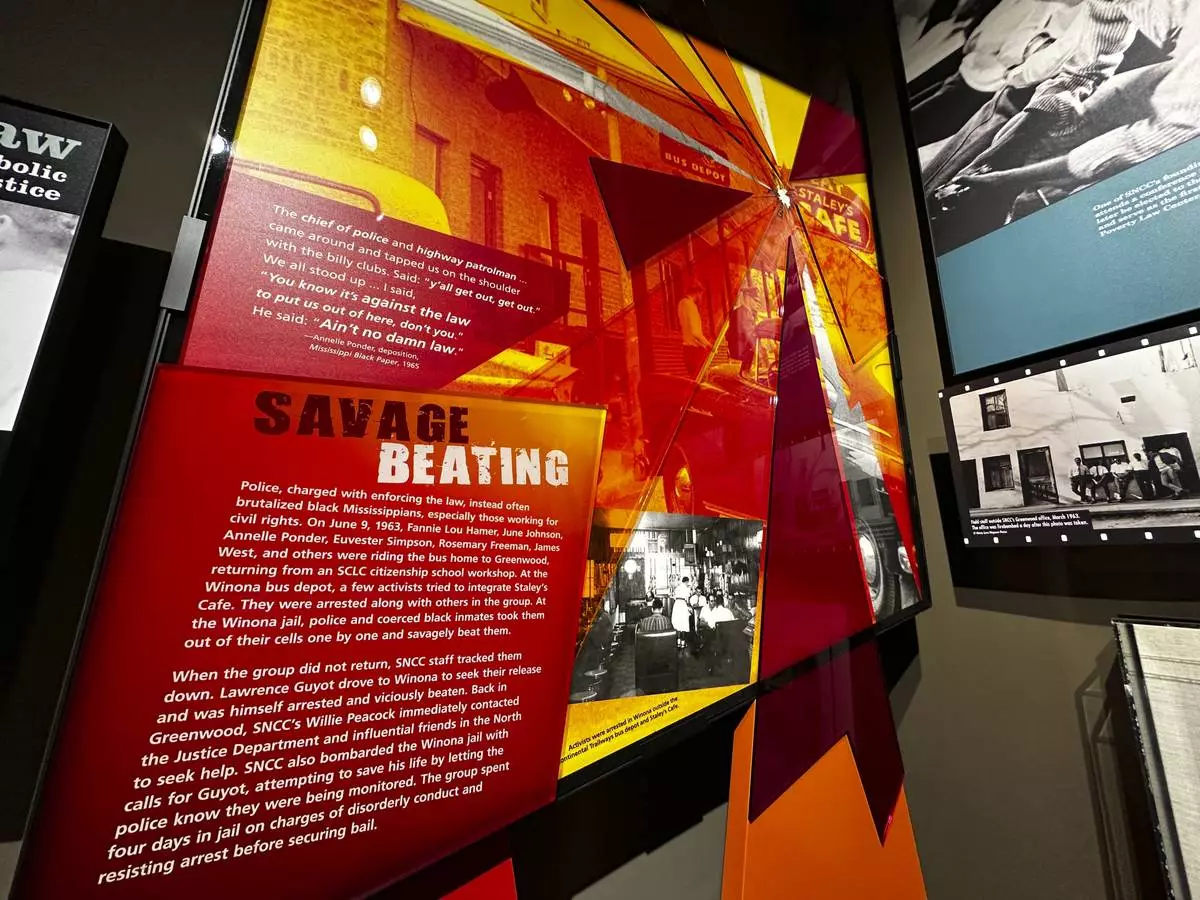
Information about the 1963 beating of civil rights activists at a jail in Winona, Miss., is shown in an exhibit in the Mississippi Civil Rights Museum on Wednesday, Aug. 14, 2024, in Jackson, Miss. (AP Photo/Stephen Smith)
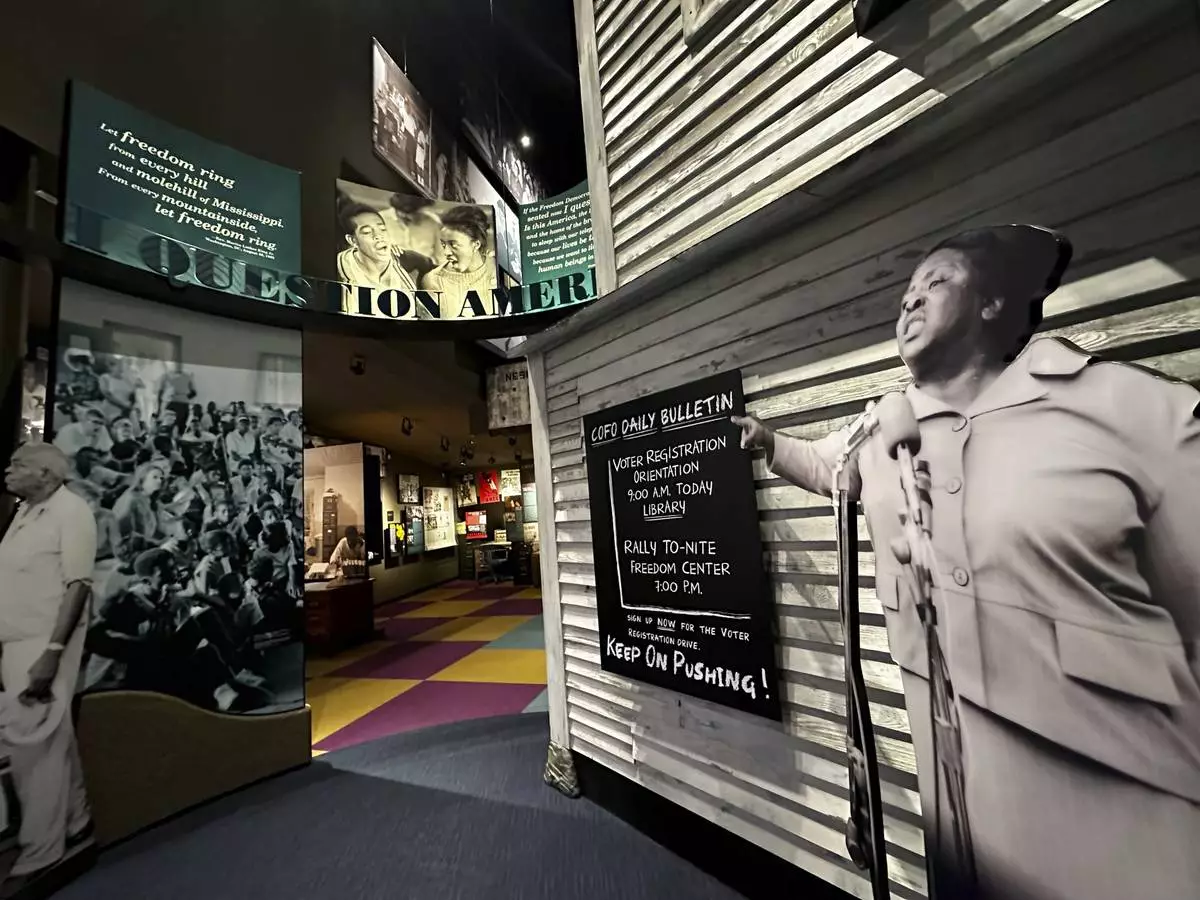
A life-size standee of Fannie Lou Hamer points to the "I Question America" is shown in an exhibit in the Mississippi Civil Rights Museum on Wednesday, Aug. 14, 2024, in Jackson, Miss. (AP Photo/Stephen Smith)
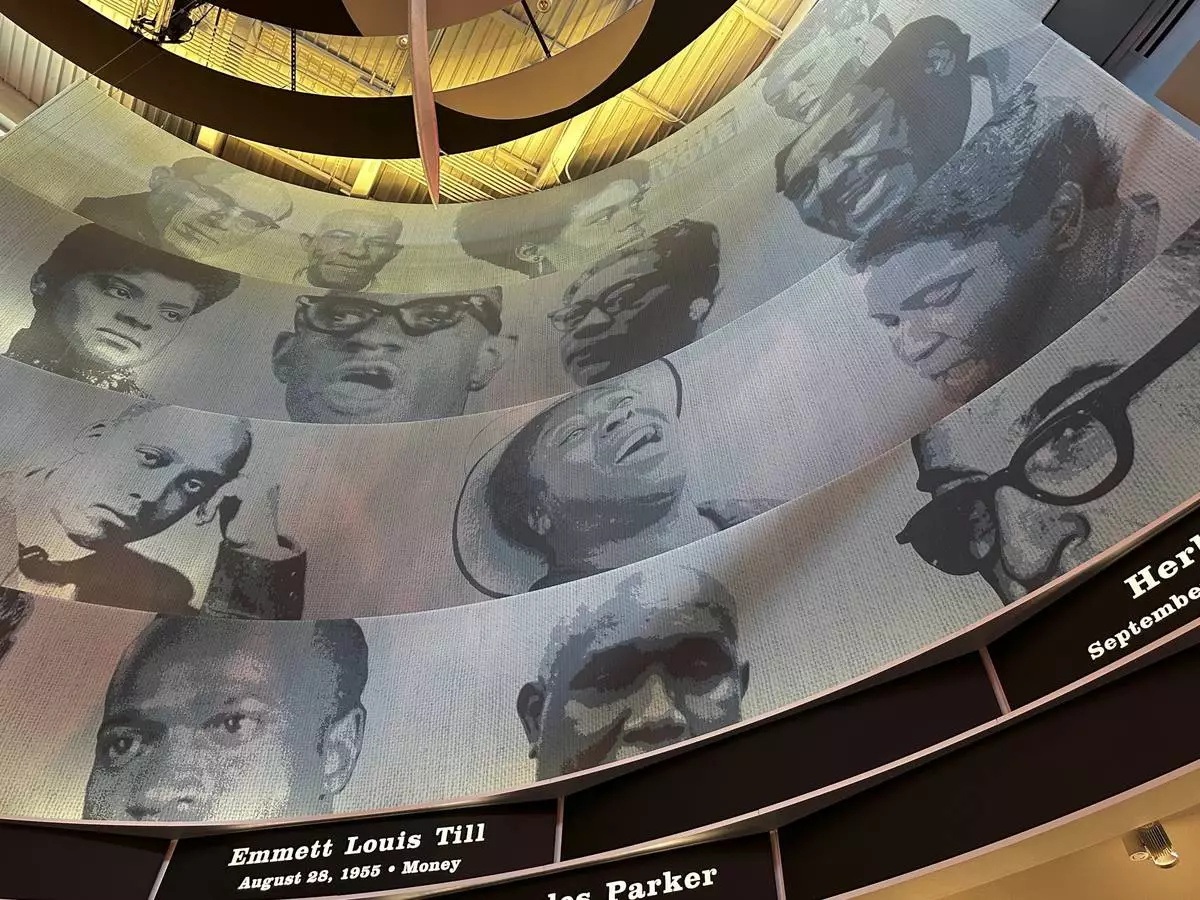
Numerous civil rights activists in the Mississippi Civil Rights Museum's central gallery, including Fannie Lou Hamer, highlight the "This Little Light of Mine" exhibit on Wednesday, Aug. 14, 2024, in Jackson, Miss. (AP Photo/Stephen Smith)
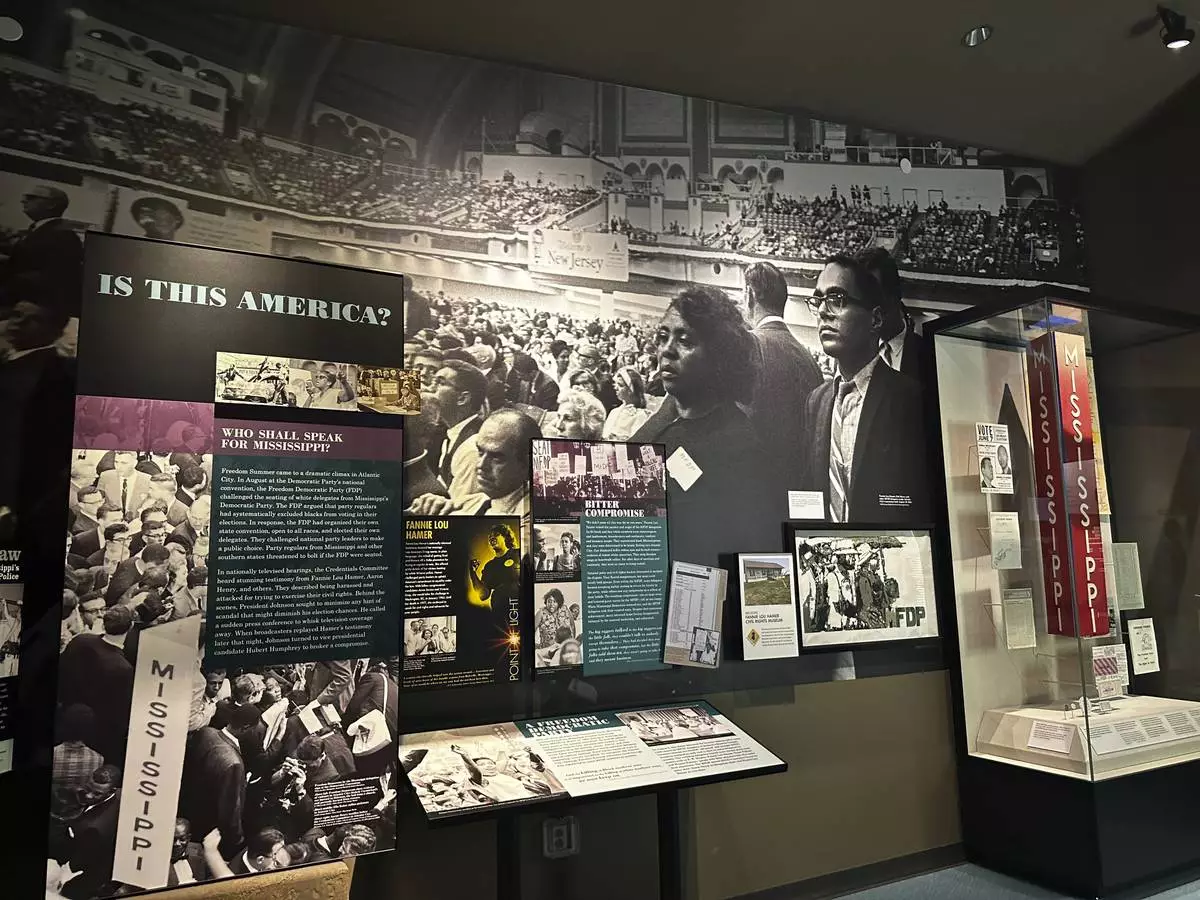
A collection of photographs from the 1964 Democratic National Convention on display inside the "I Question America" exhibit in the Mississippi Civil Rights Museum on Wednesday, Aug. 14, 2024, in Jackson, Miss. (AP Photo/Stephen Smith)
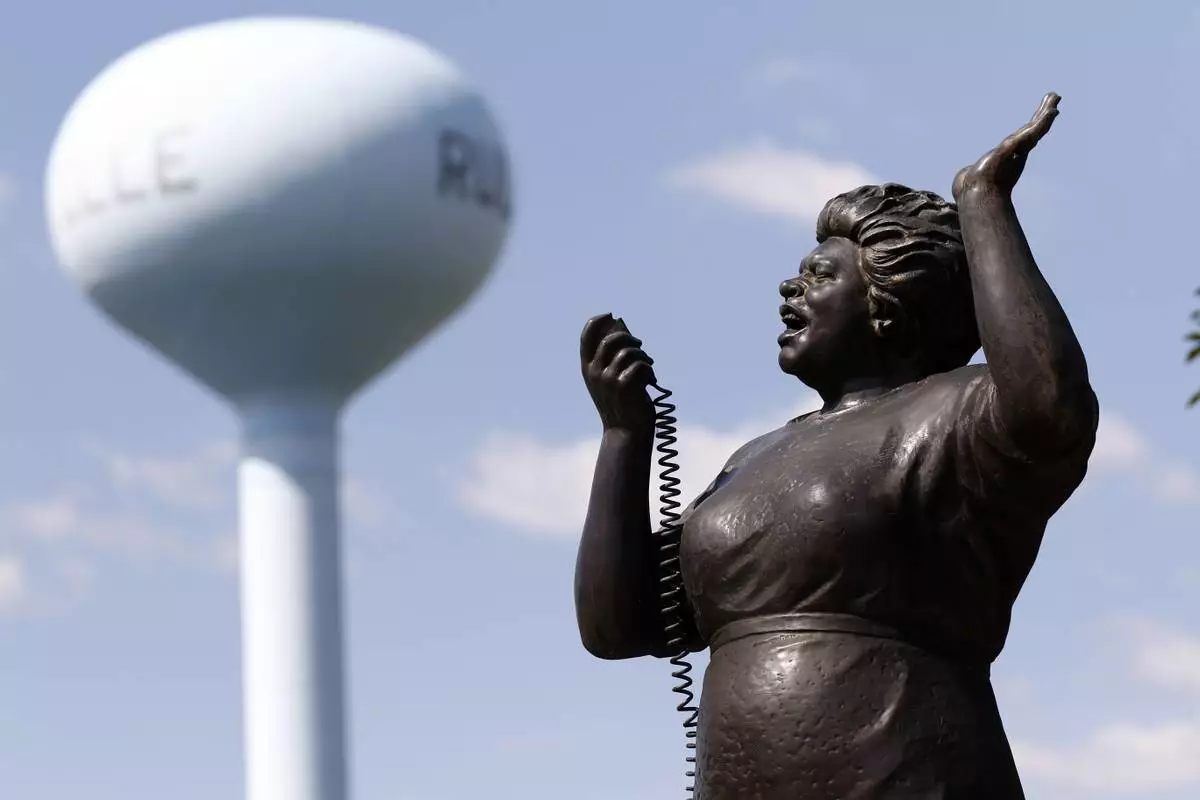
FILE - A statue of the late civil rights activist Fannie Lou Hamer is displayed in a memorial garden in her hometown of Ruleville, Miss., on Oct. 5, 2017. (AP Photo/Rogelio V. Solis, File)
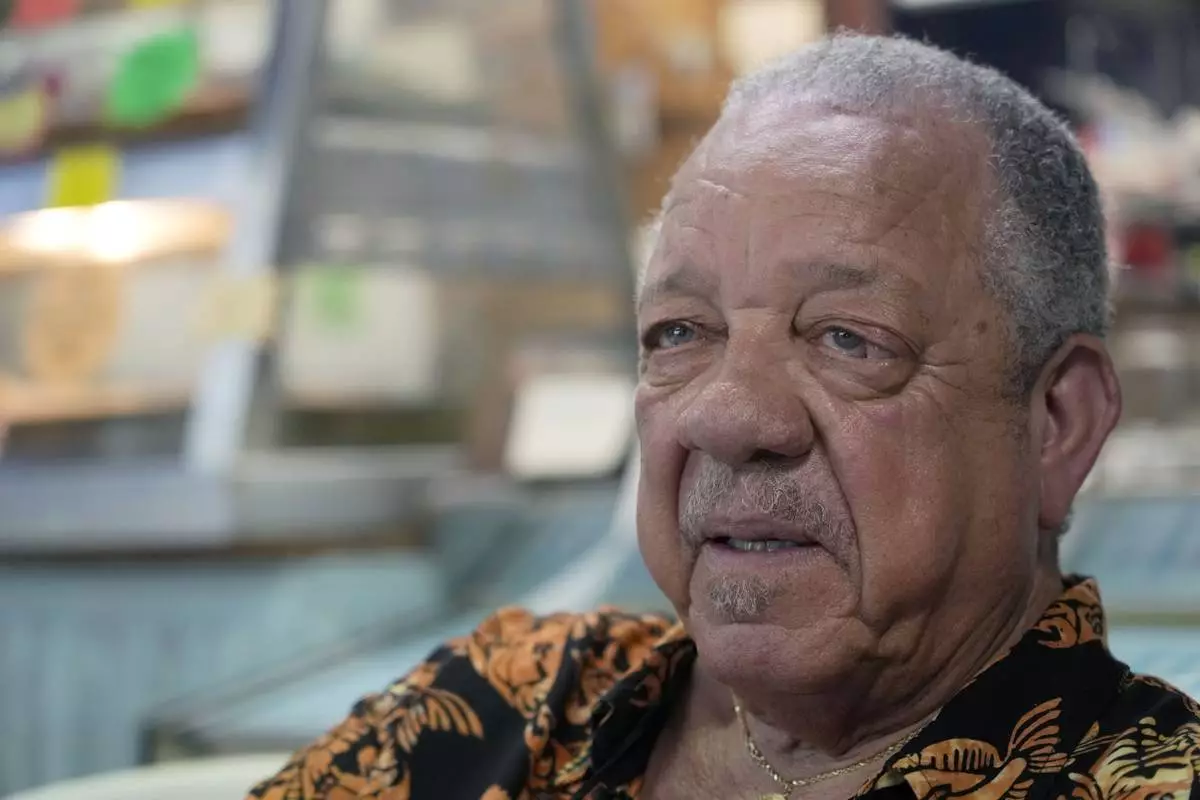
David J. Dennis Sr., a longtime activist in the Civil Rights Movement, speaks June 14, 2024, in Philadelphia, Miss., after the unveiling of a Mississippi Freedom Trail marker commemorating the June 1964 murders of civil rights workers Michael Schwerner, James Chaney and Andrew Goodman. (AP Photo/Rogelio V. Solis)
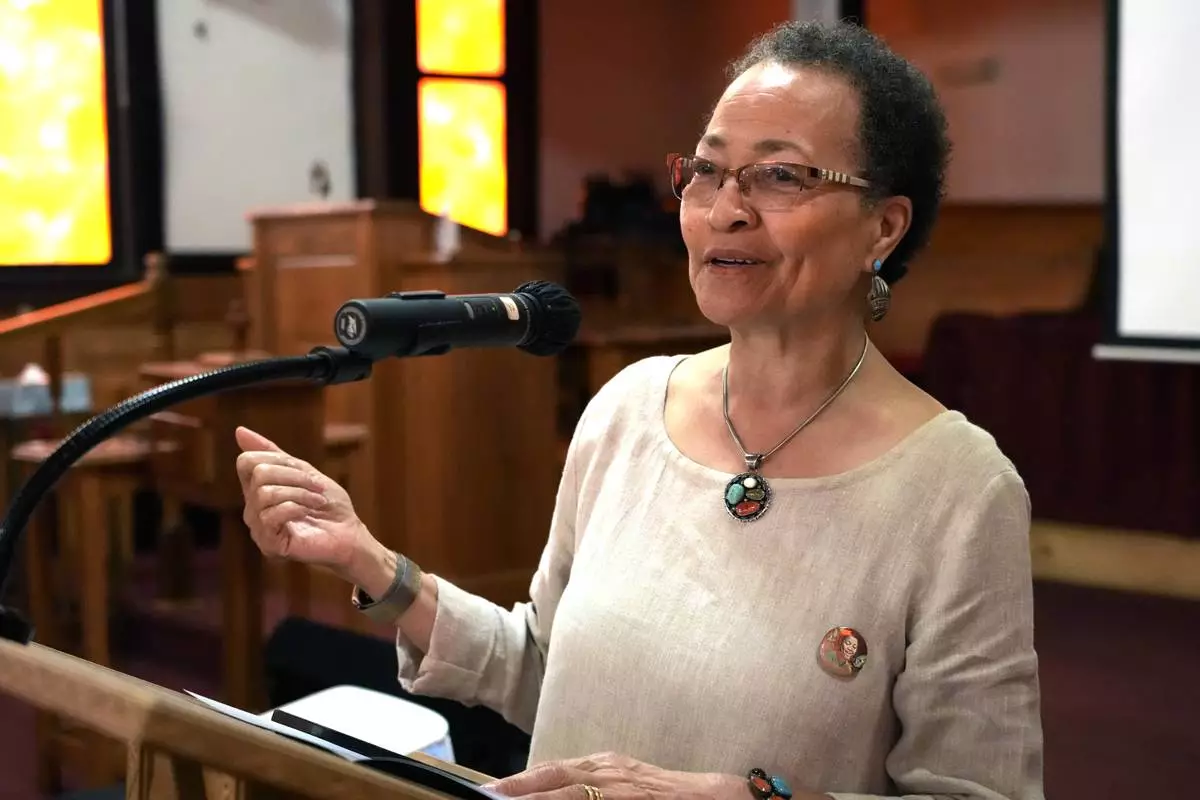
Euvester Simpson speaks June 8, 2024, in Winona, Miss., during the unveiling of a Mississippi Freedom Trail marker commemorating the brutality faced by her and other civil rights activists who were arrested in June 1963, at a bus station in Winona, as they returned from an out-of-state citizenship training session. (AP Photo/Rogelio V. Solis)
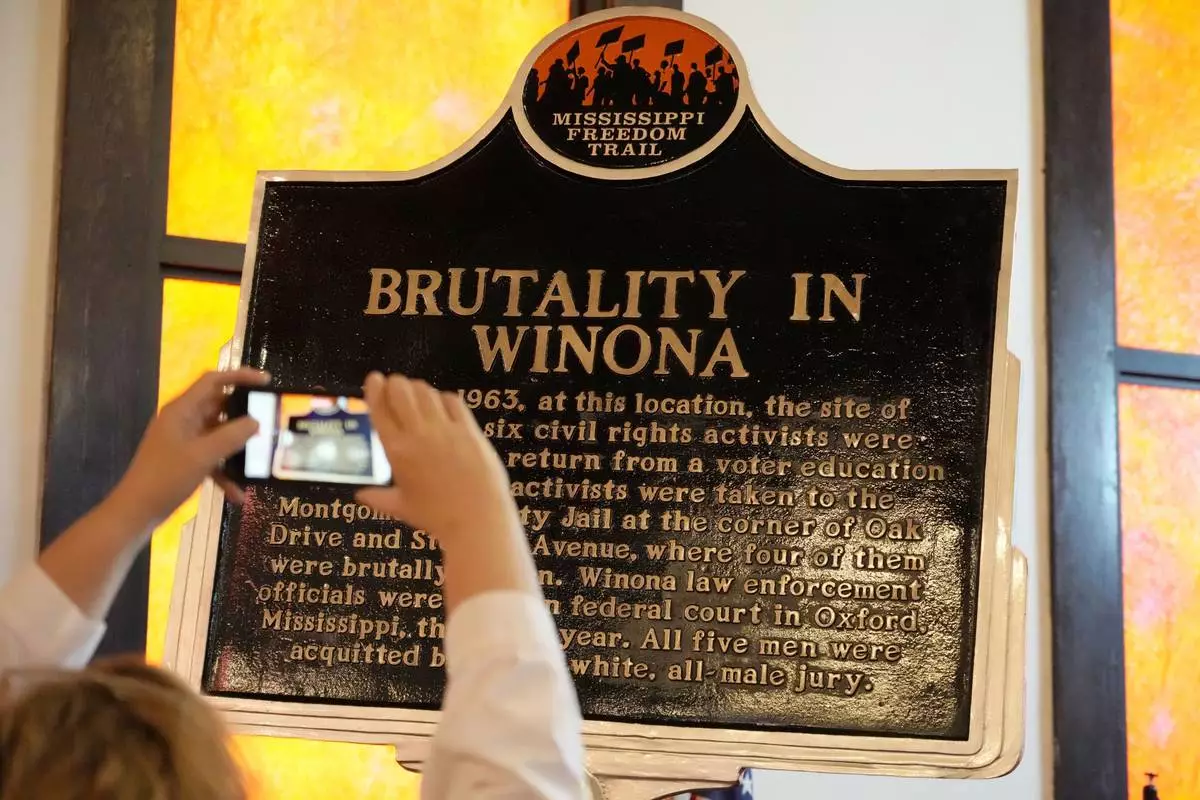
An attendee takes a cell phone photo, June 8, 2024, following the unveiling in Winona, Miss., of a Mississippi Freedom Trail marker commemorating the brutality faced by Fannie Lou Hamer and other civil rights activists who were arrested in June 1963, at a bus station in Winona as they returned from an out-of-state citizenship training session. (AP Photo/Rogelio V. Solis)
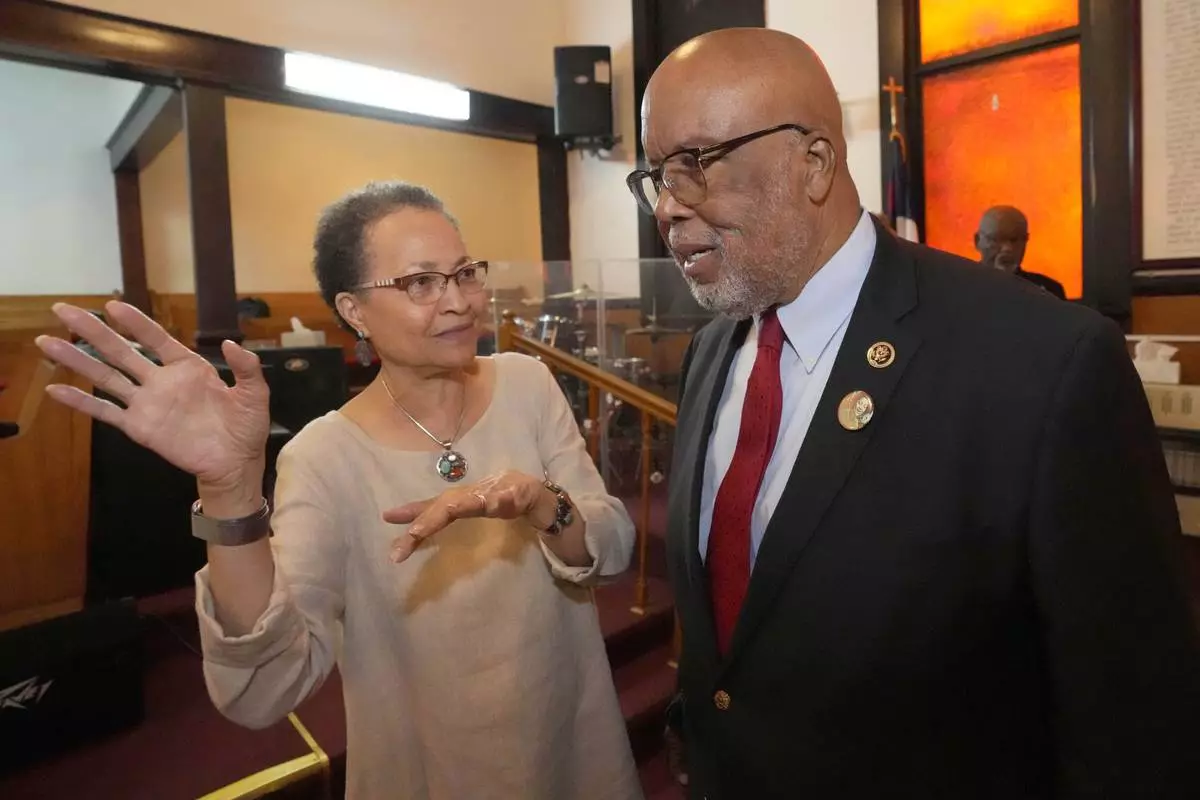
Euvester Simpson speaks with U.S. Rep. Bennie Thompson, D-Miss., June 8, 2024, in Winona, Miss., during the unveiling of a Mississippi Freedom Trail marker commemorating the brutality faced by her and other civil rights activists who were arrested in June 1963, at a bus station in Winona as they returned from an out-of-state citizenship training session. (AP Photo/Rogelio V. Solis)
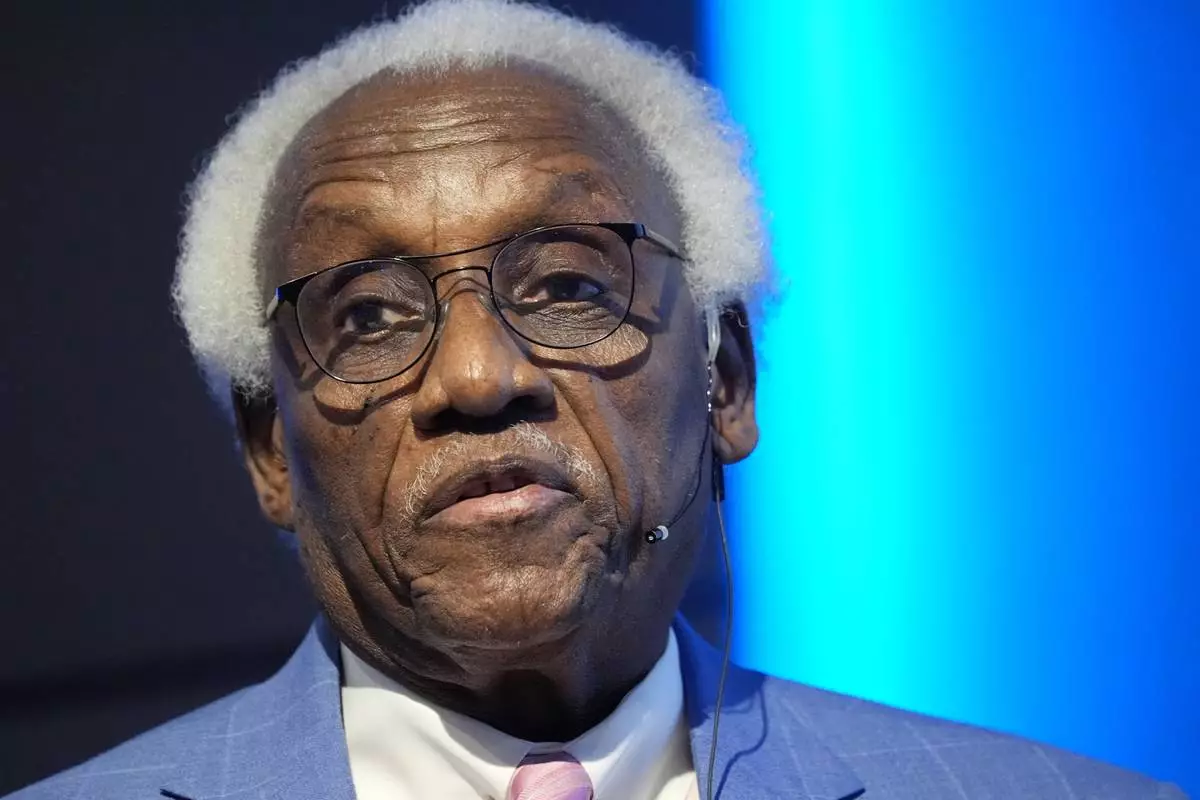
Leslie-Burl McLemore, a retired Jackson State University political science professor and longtime civil rights activist, speaks July 10, 2024, at the Mississippi Civil Rights Museum and Museum of Mississippi History in Jackson, Miss. (AP Photo/Rogelio V. Solis)

A newly unveiled Mississippi Freedom Trail marker on the boardwalk in front of Boardwalk Hall in Atlantic City, N.J., Tuesday, Aug. 20, 2024, commemorates Fannie Lou Hamer, a leader of the Mississippi Freedom Democratic Party, whose speech at the 1964 Democratic National Convention mesmerized the nation. (AP Photo/Ted Shaffrey)
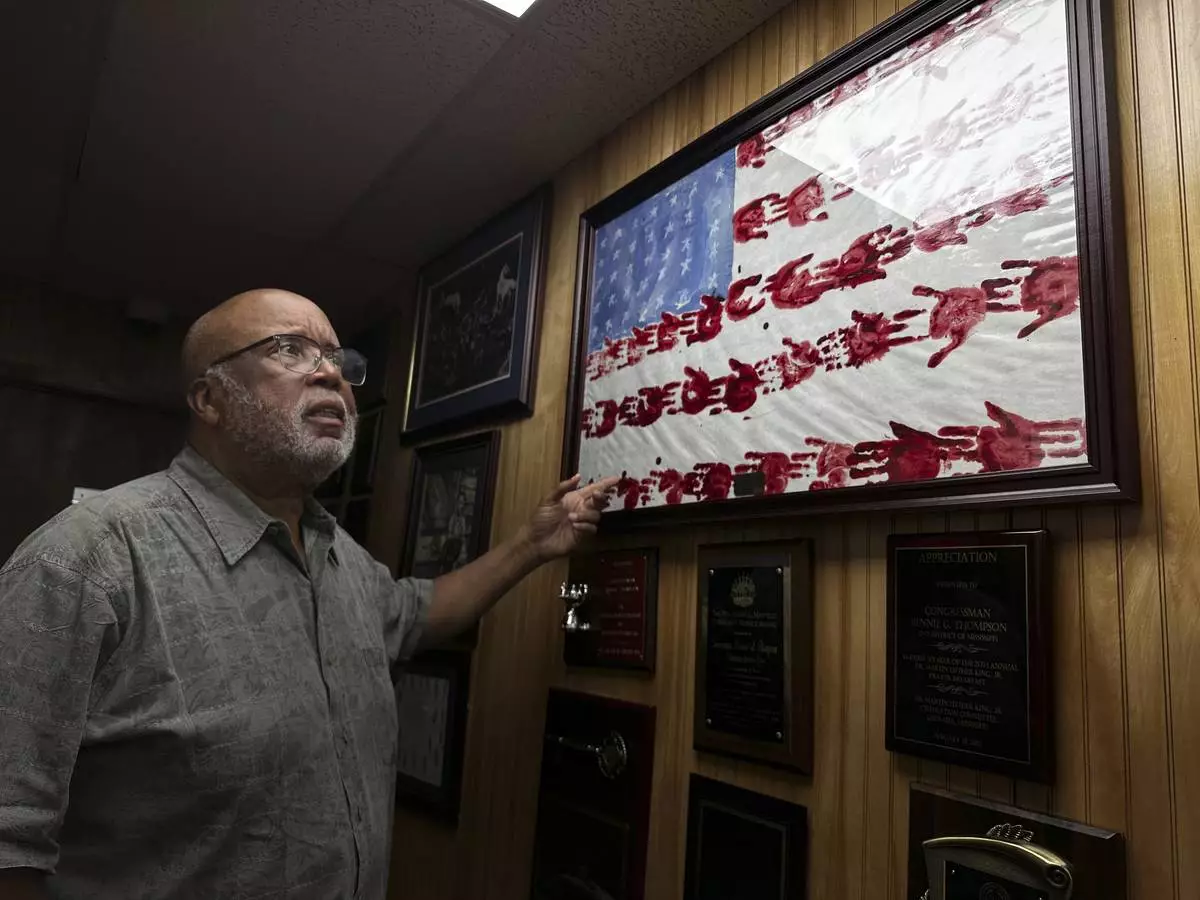
Rep. Bennie Thompson, D-Miss., shows artwork, completed by Elementary School students, from his office on Wednesday, Aug. 14, 2024, in Bolton, Miss. (AP Photo/Stephen Smith)
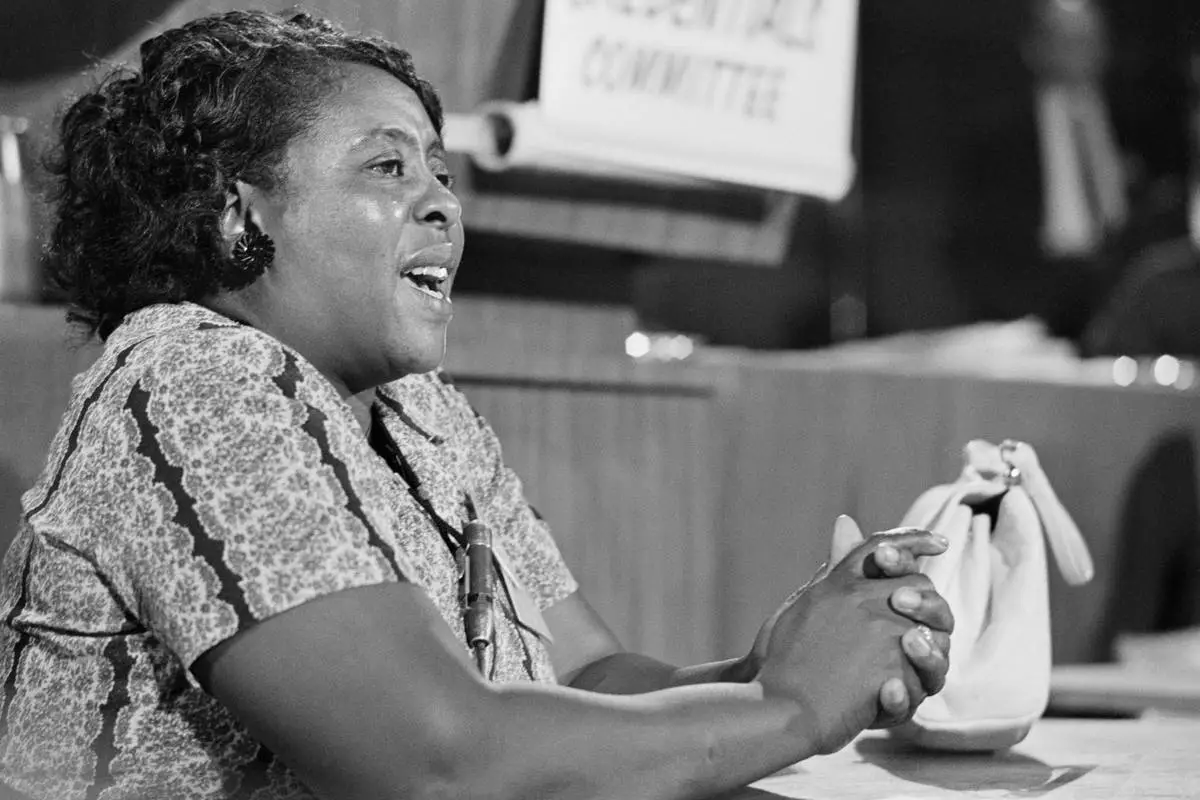
FILE - Fannie Lou Hamer, a leader of the Mississippi Freedom Democratic Party, testifies before the credentials committee of the Democratic National Convention in Atlantic City, N.J., on Aug. 22, 1964, as her racially integrated group challenged the seating of the all-white Mississippi delegation. (AP Photo, File)


